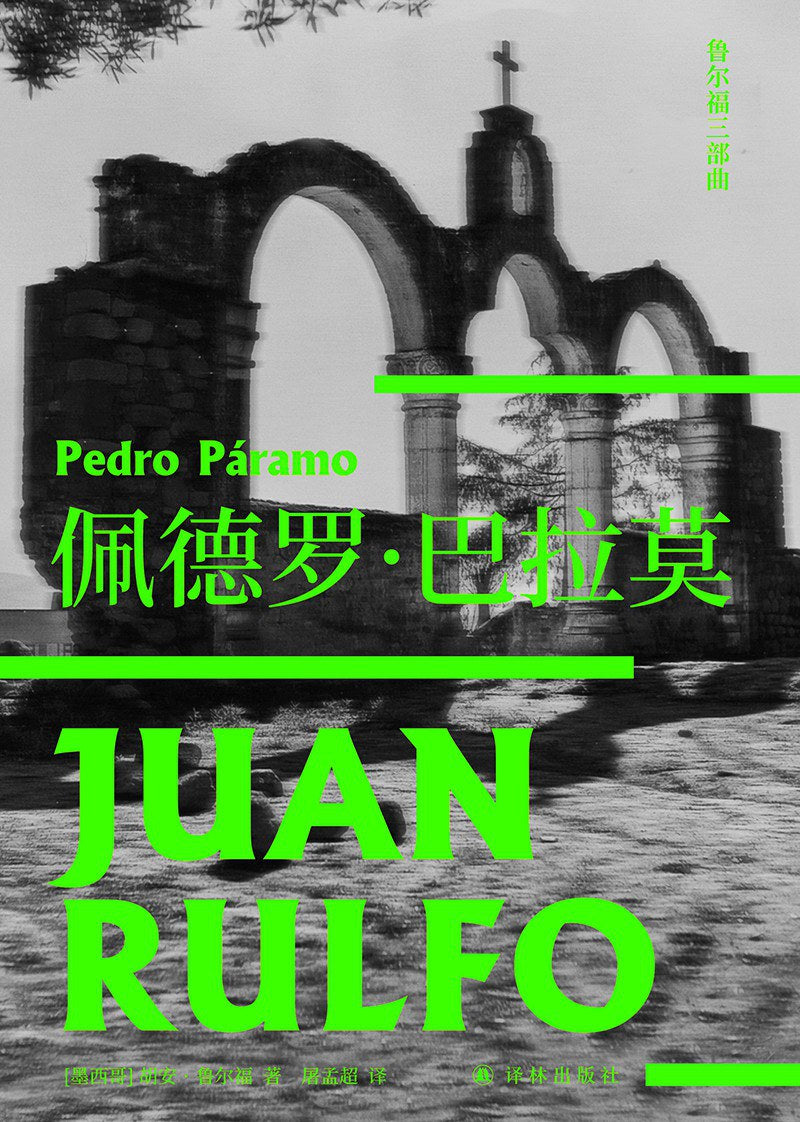WULOLIFE
《佩德罗·巴拉莫: 鲁尔福三部曲》 作者: [墨西哥] 胡安·鲁尔福 译者: 屠孟超 出版社:译林出版社
《佩德罗·巴拉莫: 鲁尔福三部曲》 作者: [墨西哥] 胡安·鲁尔福 译者: 屠孟超 出版社:译林出版社
Couldn't load pickup availability
Description
内容简介· · · · · ·
“鲁尔福三部曲”《燃烧的原野》《佩德罗·巴拉莫》《金鸡》
★魔幻现实主义小说流派的开山鼻祖,被誉为“拉丁美洲新小说的先驱”,引领拉美“文学爆炸”的潮流
★ 没有鲁尔福,或许就没有《百年孤独》——
《百年孤独》经典开篇的雏形,灵感来源于《佩德罗·巴拉莫》
从鲁尔福的作品中,加西亚·马尔克斯“找到了继续写书而需寻找的道路”
——
马尔克斯、大江健三郎、勒克莱齐奥……他们都热爱鲁尔福描写原野的笔触;
余华、莫言、苏童……他们都曾受到鲁尔福的深刻影响
★知名翻译家/学者赵振江、屠孟超、张伟劼、金灿从西班牙语直译,附序言导读,收录加西亚·马尔克斯长文序言、作家自述、鲁尔福基金会献词等珍贵内容
★丛书封面独家采用鲁尔福私人摄影,展现作家眼中广袤而迷人的墨西哥大地,藏读两宜
---------------------------------------------
《佩德罗·巴拉莫》
◎ “人生短暂,长眠无期。”
◎
◎ 鲁尔福最为人熟知的成名代表作,一部荒原寻根、回望百年兴衰的当代墨西哥神话
【内容简介】
为完成母亲的遗愿,我来到小城科马拉,寻找从未谋面的父亲佩德罗·巴拉莫。好心的赶驴人指引我投宿爱杜薇海斯太太家——她似乎一早就在等待我的到来。村庄荒芜凋敝,却时常能听见擦地而行的脚步声、像蜂群一样压得紧紧的嗡嗡声,那里的生命好像在低声细语,随风荡漾……
通过和他们的交谈,往日的科马拉渐渐浮现:佩德罗·巴拉莫幼年家道中落,靠着巧取豪夺一跃成为统治者,无恶不作。然而,他唯一承认的儿子坠马而亡,历经半生娶到的爱妻疯癫而死,他诅咒整个村庄,自己也在劫难逃……
【名人评价】
我能够背诵全书,且能倒背,不出大错,并且我还能说出每个故事在我读的那本书的哪一页上,没有一个人物的哪种特点我不熟悉。
——加西亚·马尔克斯
《佩德罗·巴拉莫》是西班牙语文坛乃至世界文坛最好的小说之一。
——博尔赫斯
胡安•鲁尔福反映的是我们土地上最后的男人和女人。
——卡洛斯·富恩特斯
鲁尔福的文字揭示了“一种并非我们的双眼所看到的景色,而是在我们视力所及的事物后面的景色。一种从来不叙说自身而叙说他物的景色,甚至是更加遥远的景色。这是一种形而上,一种宗教,一种人和宇宙的思想。(……) "
——奥克塔维奥·帕斯
鲁尔福的小说不仅是20世纪文学的杰作,也是20世纪影响最大的书籍之一。
——苏珊·桑塔格
我认为最出色的作品是墨西哥的题为《佩德罗·巴拉莫》的小说。在我的印象里,该作品说的好像是死去的人和活着的人呼吸着同一空气并在一起生活,我觉得这部小说非常棒!那位作家可是理应位于拉美文学中心的人物啊。
——大江健三郎
《佩德罗·巴拉莫》迄今仍旧被很多作家、评论家们认为是20世纪拉丁美洲小说的巅峰之作,只有《百年孤独》等少数小说才可与之争锋。
——邱华栋
是胡安·鲁尔福第一次真正打开了时间的入口,正是那种神秘的、非理性的、拥有多种时间、跨越生死、打破逻辑的观念,才让他着魔似的将“地的写作推到了一个梦幻般的神性的极致。
——吉狄马加
胡安·鲁尔福在《佩德罗·巴拉莫》和《燃烧的原野》的写作中,显示了写作永不结束的事实。
——余华
《佩德罗·巴拉莫》是一座文学高峰,只能仰视和默默攀爬。
——苏童
对我有重要影响的一部小说是胡安·鲁尔福的《佩德罗·巴拉莫》。胡安·鲁尔福在这本小说中把阴阳之间的界限彻底打破了,没有膈膜感,在这点上远远超过了我们的《西游记》和《聊斋志异》。
——阎连科
鲁尔福的小说像墨西哥乡间游荡的,无头无尾,歌词迷离的忧伤歌曲。
——张佳玮
作者简介· · · · · ·
胡安·鲁尔福(1917—1986)
一生只留下篇幅极其有限的作品,却被众多作家奉为文学偶像。墨西哥国家文学奖、比利亚乌鲁蒂亚文学与奥克塔维三驾马车”。
1917: ,并于1953年以《燃烧的原野》为题结集出版。
1955年,《佩德罗·巴拉莫》问世。小说不仅立意深刻,在艺术形式上也富有新意,迄今仍被认为是“拉丁美洲文学的巅峰小说之一”,在世界各国广为流传。
1956年,鲁尔福回到首都写作商业电影脚本,此后不久《金鸡》完成。《金鸡》于1964 in 1980 in 1980 in
1986, 1986
